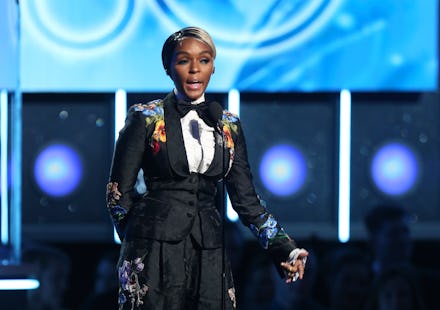Here’s why Sunday’s Grammys have Twitter saying #GrammysSoMale

In 2015, the nominations for the Academy Awards were famously met with the hashtag #OscarsSoWhite — and now, Sunday night’s Grammys has inspired a new rallying cry: #GrammysSoMale.
The most visible reason behind the new controversy is that men won all but one of the Grammys’ televised awards. Alessia Cara, the lone female winner, took home the prize for best new artist. SZA, this year’s most-nominated female artist — she was up for a total of five trophies — won zero awards.
In response to #GrammysSoMale, the Recording Academy president Neil Portnow said women “need to step up because I think they would be welcome,” according to Variety. Portnow’s response has drawn the ire of many, who noted that women have been “stepping up” for a long time.
But that’s not where Grammys viewers’ gripes about the lopsided gender dynamics end. Before the ceremony, Variety reported that Lorde — whose album Melodrama was nominated for album of the year — wouldn’t be performing on stage because she wasn’t offered a solo performance slot. The show’s organizers reportedly wanted the New Zealand-born Lorde to perform with a group as part of a Tom Petty tribute featuring his song “American Girl,” which she declined. Every other album-of-the-year nominee — all of whom are men of color — was reportedly given the opportunity to perform their own music during the telecast; Jay-Z reportedly declined.
Lorde hasn’t directly responded to these reports, but in a tweet Monday morning, she wrote, “IF YOU’RE DEBATING WHETHER OR NOT I CAN MURDER A STAGE... COME SEE IT FOR URSELF,” which she capped off with the smiley-wearing-a-halo emoji and a link to buy tickets to her tour.
To add insult to injury, Grammys producer Ken Ehrlich left a lot to be desired when he tried to defend the distinct lack of Lorde in Sunday’s ceremony.
“I don’t know if it was a mistake,” he said when Variety asked whether it was a mistake not to offer Lorde a solo performance slot. “These shows are a matter of choices. We have a box and it gets full. She had a great album. There’s no way we can really deal with everybody.”
It’s worth noting that Grammys producers managed to find space for U2’s Bono to perform twice, and for Sting — who wasn’t nominated for anything — to perform with Shaggy.
Despite #GrammysSoMale making the rounds, the telecast did feature one moment that unquestionably put women front and center: Kesha’s performance of “Praying,” a single from her latest album, Rainbow. She was surrounded by a group of women — Cyndi Lauper, Bebe Rexha and Camila Cabello among them — dressed in all white. Though it wasn’t stated outright, it’s been widely assumed that Kesha’s emotional performance, as well as the song itself, were directed toward her alleged abuser, Sony Music producer Dr. Luke.
Singer and actress Janelle Monáe introduced the performance with a rousing speech in support of #MeToo and the Time’s Up movement, urging the music industry to take a more vocal, visible stand against sexual misconduct.
“We come in peace, but we mean business,” Monáe said, according to the Daily Beast. “And to those who would dare try and silence us, we offer you two words: Time’s up. We say time’s up for pay inequality, time’s up for discrimination, time’s up for harassment of any kind and time’s up for the abuse of power. Because, you see, it’s not just going on in Hollywood, it’s not just going on in Washington — it’s right here in our industry as well.”
As cathartic as the moment might’ve felt for some, Mic’s own Brianna Provenzano noted that the speech and performance felt like outliers in an evening otherwise concerned with celebrating men.